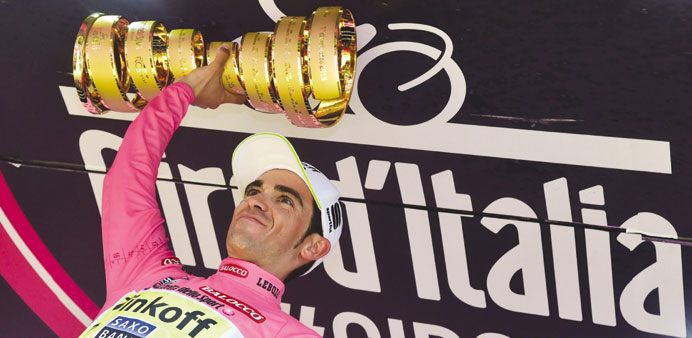Spain’s Alberto Contador celebrates with his trophy on the podium after winning the 98th Giro d’Italia cycling race in Milan on Sunday. (AFP)
By William Fotheringham/The Guardian
Few editions of the Giro d’Italia have been as full of surprises as this year’s and Saturday’s epic stage over the unpaved Colle delle Finestre served up one final twist in the tale when Alberto Contador finally showed signs of weakness and lost time to his leading rivals but hung on to the race leader’s pink jersey to claim the seventh major Tour of his career when the race finished in Milan on Sunday afternoon.
Contador has thus set up the first half of what he hopes will be a double of victories in the Giro and Tour de France in the same summer - his flamboyant team chief, Oleg Tinkoff, has already begun making noises about a possible tilt at the Tour of Spain - but only in July will it become apparent how much this surprisingly gruelling win in the Italian race has taken out of the 32-year-old Spaniard.
Contador had to overcome a dislocated shoulder to claim the second Giro of his career and his Tinkoff-Saxo team were never quite as strong as they needed to be in the mountain stages, leaving him isolated time after time until finally it all clearly told on Saturday. “The Tour de France starts now for me,” he said afterwards. His next race is expected to be the Route du Sud on 18-21 June. “Tomorrow I want to go to Spain and I’ll spend three or four days there isolated completely before I start work again for the Tour.”
The 2015 Giro boiled down to a duel between Contador and the Astana squad led by the Italian Fabio Aru, who finished second, and the Spaniard Mikel Landa. Events on the Finestre suggested that, if Astana - and Landa in particular - had put pressure on Contador earlier in the final week with long-range attacks to test him and his team, the outcome might have been even more of a cliff-hanger. On the seven kilometres of dirt track leading to the 2178m-high Finestre, it was Landa who did the damage, forcing Contador into a chase that took him dangerously close to cracking.
As it was, after Saturday’s stage finish at Sestriere, where he had finished 2min 29sec behind the young Italian, Contador had reason to be glad he had taken full advantage of the unwillingness of Astana’s Italian management to back the Spaniard Landa over the home darling Aru. The double Tour de France winner took a key advantage in the time trial on the stage 14 time trial to Valdobbiadene but critically he seized every occasion to gain seconds, most notably with a long-distance attack on Thursday’s stage into Verbania.
While Aru will no doubt now be presented as a probable successor - and possible rival - to his team-mate Vincenzo Nibali, winner of last year’s Tour de France, both men are riding for a team that remains effectively on probation pending further developments in the lengthy saga of positive drugs tests and ethical audits that has dogged Astana since last November. They will go to the Tour de France ready to support Nibali but they will do so under a cloud.
If Astana’s future remains a matter for conjecture, the same has to be said of the Australian Richie Porte’s career as a Grand Tour contender. One of the most likable and talented riders in the peloton, Porte dominated short stage races at the start of the season and came to the Giro in perfect form only to be undone by a crash on the flattest stage of the race into Lido di Jesolo.
That followed a bizarre pratfall on the road to Forli on day 10 where the Team Sky leader was docked two minutes after accepting a spare wheel from a fellow Australian, Simon Clarke, who rides for a rival team, Orica-GreenEdge, when he punctured in the final few kilometres. This kind of episode is rarely seen among contenders for a major Tour which - as well as the red mist which descends on such occasions - explains Porte’s instantaneous reaction if not the harsh reaction of the race referees.
That epitomised a Giro that was unforgiving as early as day two when an amateur cyclist with a fixie veered into the peloton to cause a mass pile-up. The crash which did for Porte also lost Contador the pink jersey, albeit for only a day; later the race leader was unlucky to come under attack from both Astana and the Russians of Katyusha when he punctured before the monumentally steep Mortirolo climb. The finger of fate pointed at all the leaders in turn - Aru came to the race after illness as well as with the Astana saga hanging over him - but in the end it was Contador’s experience and cool head which saw him through.

